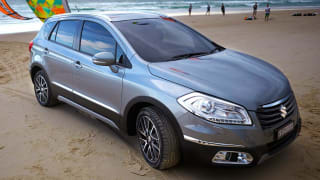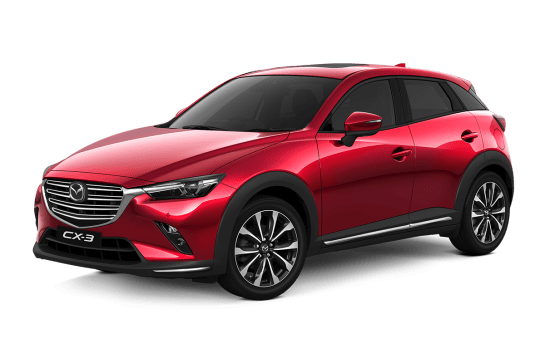
2014 Suzuki S-Cross GLX Prestige review
We turn the spotlight on the car world's newest and brightest stars as we ask the questions to...
Browse over 9,000 car reviews
Just when you thought the car world had enough SUVs, stand by for a flood of new models that will soon squeeze their way into our busy lives and cramped parking spaces.
A few big brands have toyed with the idea of a pint-sized SUV before, but few have come up with the right formula.
The Holden Trax has ungainly Dumbo Elephant looks even though it is nice to drive and has an exceptionally roomy and practical cabin.

The Suzuki S-Cross, one of the pioneers of the segment, looks more like a hatchback than the SUV appearance buyers crave.
The Ford EcoSport looks the part (it even has a spare wheel mounted on the rear cargo door, just like a heavy duty 4WD) but isn’t backed up by the right choice of engines and transmissions for Australia, and not everyone is a fan of its Made-In-India build quality.
Meanwhile the daring Nissan Juke, with its ‘crocodile eyes’ headlights, clearly doesn’t know if it wants to be a hatchback or a Jeep.
So you can imagine when one car comes along that looks like it has nailed the city-sized SUV formula, there is an element of excitement. Especially when it is the fastest growing segment of the new-car market (there are six all-new entrants next year alone).
According to Mazda insiders, when upper management was shown a clay model of the CX-3 two years ago, the designers were immediately told: “build that, don’t change a thing”, or words to that effect in Japanese.
Rarely does any car gain such universal approval so high up the food chain so early in the crippling and bureaucratic development process.
Even more rare: management and marketing executives resisting the urge to help style the car over the designer’s shoulders, even after approval has been given.
The anticipation of Mazda’s next big hit possibly explains why the company air-freighted two cars from Japan to give Australian media the world’s first test drive this week.
The two CX-3s -- one petrol, one diesel -- had barely cleared customs when Mazda threw the keys to local media to put the CX-3 through its paces inside a private vehicle testing facility that is customarily designed to break cars or highlight their flaws.
The Australian Automotive Research Centre in Anglesea, about 125km south west of Melbourne, near Geelong, is much like the proving grounds owned by Ford and Holden, with sections of punishing road, as well as copies of the pavement found in the real world.
Mazda also sent five senior executives with the cars, including the chief engineer and chief designer. Australian test drives rarely gain such attention.
Mazda is a relative minnow in Japan but it is poised to overtake Holden as the second-biggest brand in Australia next year.
Holden has never been outside the top two sellers in its 66-year history. But this sharply-styled up-start is the car that will likely get Mazda over the line.
Not convinced? It was the Mazda3 small car that ended the Holden Commodore’s record 15-year winning streak three years ago.
The Mazda CX-3 may look big, but it is in fact based on the baby of the range, the Mazda2. Even the dashboard is the same*.
It is longer and wider than a Mazda2, bit will fit in a smaller parking space than the Mazda3.
Its boot (264L for the pedantic) is bigger than a Mazda2’s (250L) but smaller than a Mazda3’s (308L) and, of course, smaller than its big brother the CX-5 (403L).
The driving position is tall like an SUV (one of the big reasons behind their popularity) and the back seat has more headroom than the Mazda3.
It’s roomy and comfortable and one of the most efficient uses of available space in the new-car market, let alone its class. You get the feeling it would be easy to spend the daily grind in this car.
The dashboard and centre console may be carried over from the Mazda2 but extra attention has been given to details such as the stitching in the seats and the pattern of the doors.
Price and equipment won’t be announced until the CX-3 goes on sale from March next year (priced from about $21,990 to $33,000 we hear) but expect a choice of petrol or diesel power, 2WD and AWD, and (we hope) a rear view camera on all models as standard.
First up was the diesel which has an on-demand all-wheel-drive system. None of the testing required all-wheel-drive (there was only 300 metres or so of gravel) but it was a great insight into the power delivery of Mazda’s all-new 1.5-litre turbo diesel engine.
If 1.5 sounds lethargic, that’s because, in a way, it is. Buyers chasing fuel economy won’t mind though (Mazda says it’ll sip less than 5L/100km), and once it’s on the move it’s fine. But from rest it’s a little slow on the uptake.
Mazda has certainly found an excellent balance between a nice steering feel and comfort over bumps, even though the top-of-the-range model tested had large 18-inch wheels and tyres.
The CX-3 drives with the same confidence as a hatchback and doesn’t have the topsy turvy feeling of some SUVs.
First impressions are that Mazda is onto another winner
Next up: the 2.0-litre petrol front-drive. It felt like a missile in comparison, even though it promises fuel economy in the 6.0L/100km bracket.
Little wonder: it’s the same engine used in the bigger and heavier CX-5. A colleague asked if Mazda was considering a performance version of the CX-3. But I think Mazda may already have it in the standard petrol model.
The car tested was in 16-inch wheels and tyres which gave a noticeably more compliant ride over bumps and the steering felt sharper (possibly aided by the lighter petrol engine than the diesel).
Faced with a choice between the two, for me there would be no choice: petrol power all the way. Besides, it’s almost as efficient as the diesel any way (and will be thousands cheaper to buy).
Downsides? There aren’t many. Road noise is a common bugbear of Mazdas and the CX-3 has its fair share, but after the brief encounter I would rank it average rather than poor.
The anti-lock brakes took longer than usual to stop on gravel (compared to other vehicles on the same type of surface) but the stability control was well sorted, even on loose rocks (although the ESC on the petrol model was more abrupt than the smoother intervention of the diesel).
It may have been a brief first drive but the test loop had almost every challenge Australian roads can muster. First impressions are that Mazda is onto another winner -- and this one happens to be in the world’s fastest growing new-car segment.
Mazda wins my vote for most honest press release from a car company in 2014. This from the interior designer who started creating his own dashboard design, only to later find Mazda was simply going to adopt the one from the Mazda2.
Verbatim from the press kit, the words of interior designer Hiroaki Saitoh:
“I began working on a 100 per cent original design before the decision came down that we would go with an instrument panel common to other models developed earlier. I was somewhat perplexed when I first heard that decision, but my spirits changed as soon as I decided to enjoy the process of seeing how attractive a design I could create, while fully leveraging the influence of the change to the common design.”
| Vehicle | Specs | Price* | |
|---|---|---|---|
| Neo (FWD) | 2.0L, ULP, 6 SP AUTO | $14,960 – 19,690 | 2015 Mazda CX-3 2015 Neo (FWD) Pricing and Specs |
| Maxx (FWD) | 1.5L, Diesel, 6 SP AUTO | $18,260 – 23,100 | 2015 Mazda CX-3 2015 Maxx (FWD) Pricing and Specs |
| Neo Safety (FWD) | 2.0L, ULP, 6 SP MAN | $13,750 – 18,150 | 2015 Mazda CX-3 2015 Neo Safety (FWD) Pricing and Specs |
| Maxx (AWD) | 2.0L, ULP, 6 SP AUTO | $14,850 – 19,470 | 2015 Mazda CX-3 2015 Maxx (AWD) Pricing and Specs |
$11,999
Lowest price, based on 209 car listings in the last 6 months